Organisational Behaviour: Teams, Motivation, Culture and Performance
VerifiedAdded on 2023/06/08
|13
|4454
|270
Report
AI Summary
This report provides a comprehensive analysis of organisational behaviour, focusing on the influence of culture, politics, and power on individual and team performance within Unilever. It evaluates content and process theories of motivation, examining how motivational techniques can effectively achieve organisational goals. The report also explores the characteristics of effective teams and analyses relevant team development theories to foster cooperation. Furthermore, it applies organisational behaviour concepts and philosophies within a business context, critically evaluating their relevance to improving business performance and productivity. The analysis includes justified recommendations for optimising the interplay between culture, politics, power, and motivation to drive organisational success.
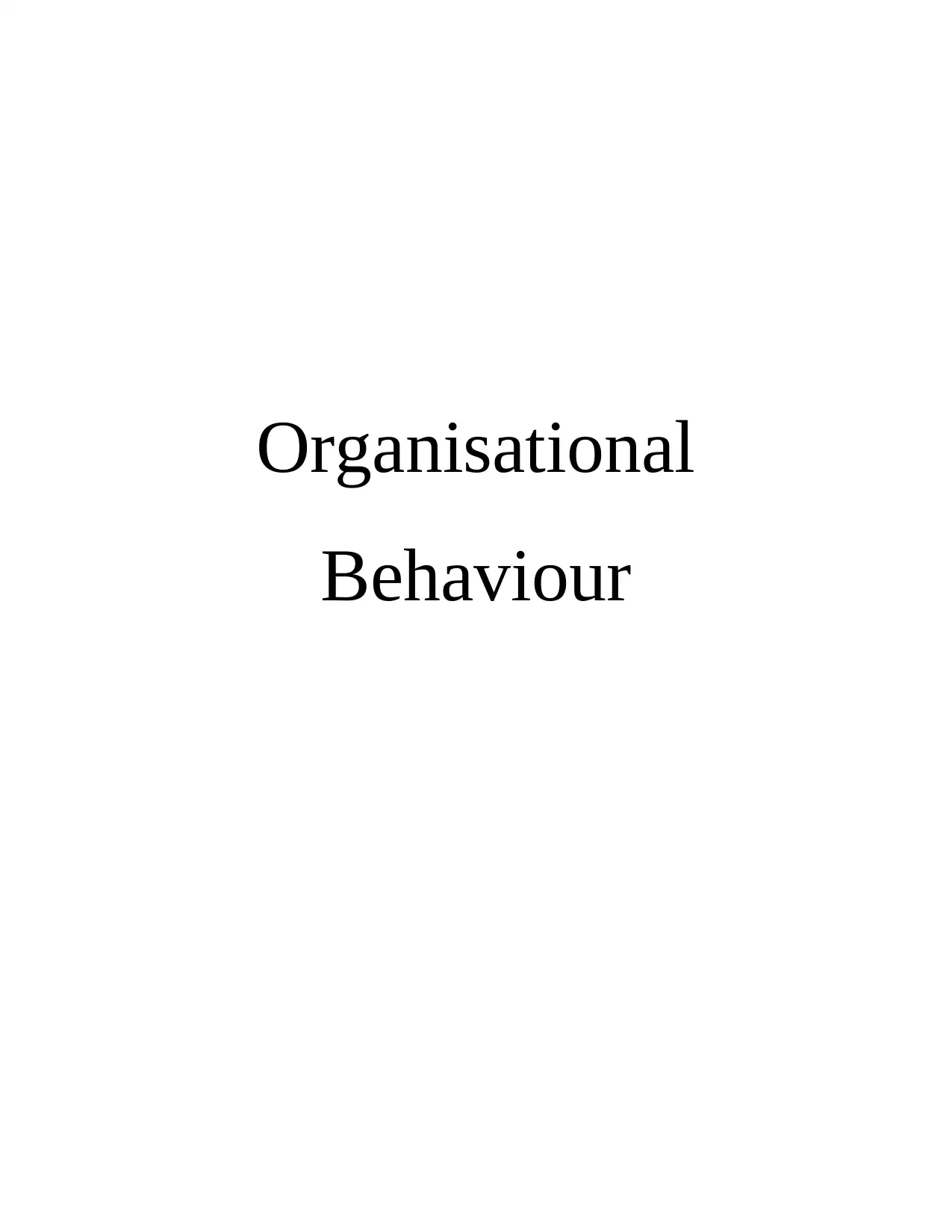
Organisational
Behaviour
Behaviour
Paraphrase This Document
Need a fresh take? Get an instant paraphrase of this document with our AI Paraphraser
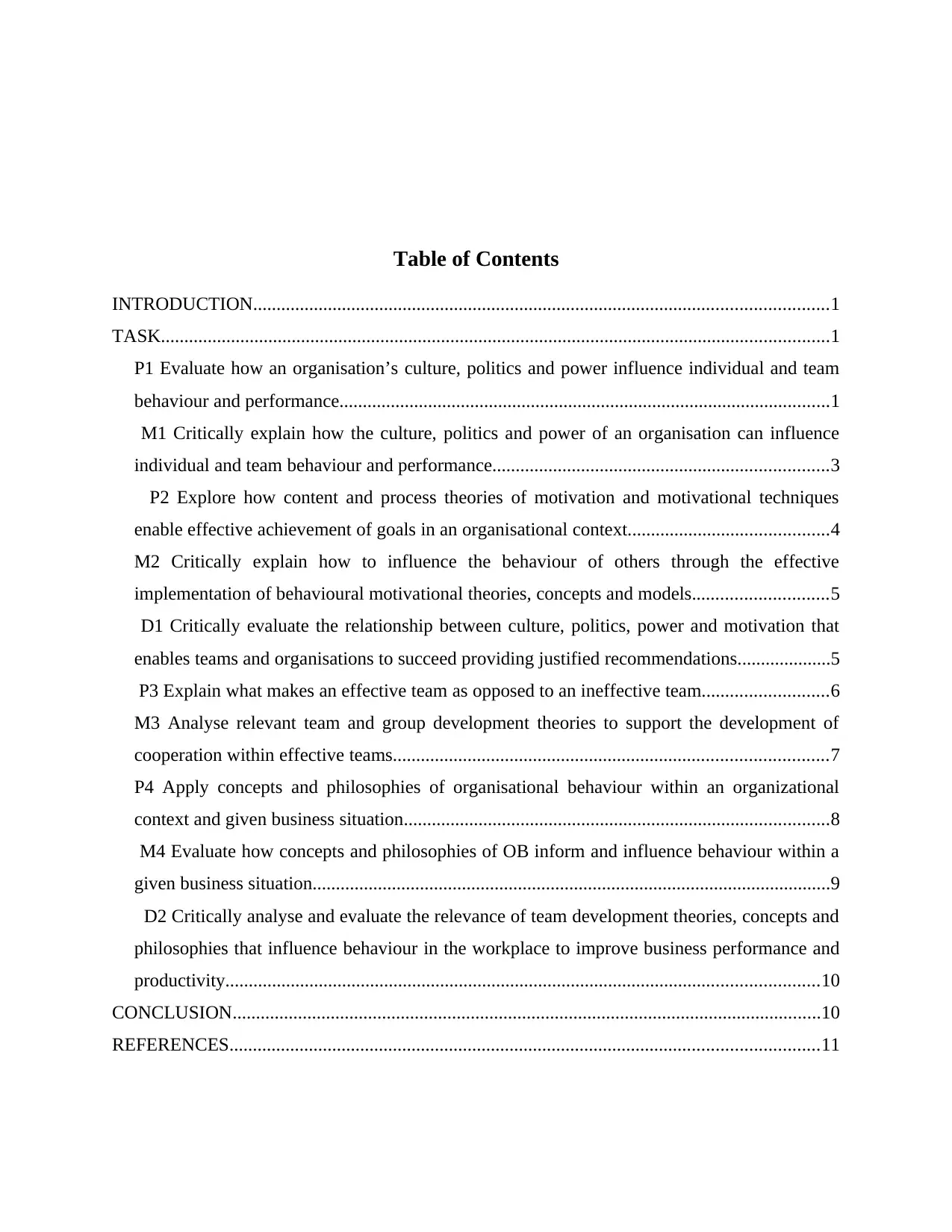
Table of Contents
INTRODUCTION...........................................................................................................................1
TASK...............................................................................................................................................1
P1 Evaluate how an organisation’s culture, politics and power influence individual and team
behaviour and performance.........................................................................................................1
M1 Critically explain how the culture, politics and power of an organisation can influence
individual and team behaviour and performance........................................................................3
P2 Explore how content and process theories of motivation and motivational techniques
enable effective achievement of goals in an organisational context...........................................4
M2 Critically explain how to influence the behaviour of others through the effective
implementation of behavioural motivational theories, concepts and models.............................5
D1 Critically evaluate the relationship between culture, politics, power and motivation that
enables teams and organisations to succeed providing justified recommendations....................5
P3 Explain what makes an effective team as opposed to an ineffective team...........................6
M3 Analyse relevant team and group development theories to support the development of
cooperation within effective teams.............................................................................................7
P4 Apply concepts and philosophies of organisational behaviour within an organizational
context and given business situation...........................................................................................8
M4 Evaluate how concepts and philosophies of OB inform and influence behaviour within a
given business situation...............................................................................................................9
D2 Critically analyse and evaluate the relevance of team development theories, concepts and
philosophies that influence behaviour in the workplace to improve business performance and
productivity...............................................................................................................................10
CONCLUSION..............................................................................................................................10
REFERENCES..............................................................................................................................11
INTRODUCTION...........................................................................................................................1
TASK...............................................................................................................................................1
P1 Evaluate how an organisation’s culture, politics and power influence individual and team
behaviour and performance.........................................................................................................1
M1 Critically explain how the culture, politics and power of an organisation can influence
individual and team behaviour and performance........................................................................3
P2 Explore how content and process theories of motivation and motivational techniques
enable effective achievement of goals in an organisational context...........................................4
M2 Critically explain how to influence the behaviour of others through the effective
implementation of behavioural motivational theories, concepts and models.............................5
D1 Critically evaluate the relationship between culture, politics, power and motivation that
enables teams and organisations to succeed providing justified recommendations....................5
P3 Explain what makes an effective team as opposed to an ineffective team...........................6
M3 Analyse relevant team and group development theories to support the development of
cooperation within effective teams.............................................................................................7
P4 Apply concepts and philosophies of organisational behaviour within an organizational
context and given business situation...........................................................................................8
M4 Evaluate how concepts and philosophies of OB inform and influence behaviour within a
given business situation...............................................................................................................9
D2 Critically analyse and evaluate the relevance of team development theories, concepts and
philosophies that influence behaviour in the workplace to improve business performance and
productivity...............................................................................................................................10
CONCLUSION..............................................................................................................................10
REFERENCES..............................................................................................................................11
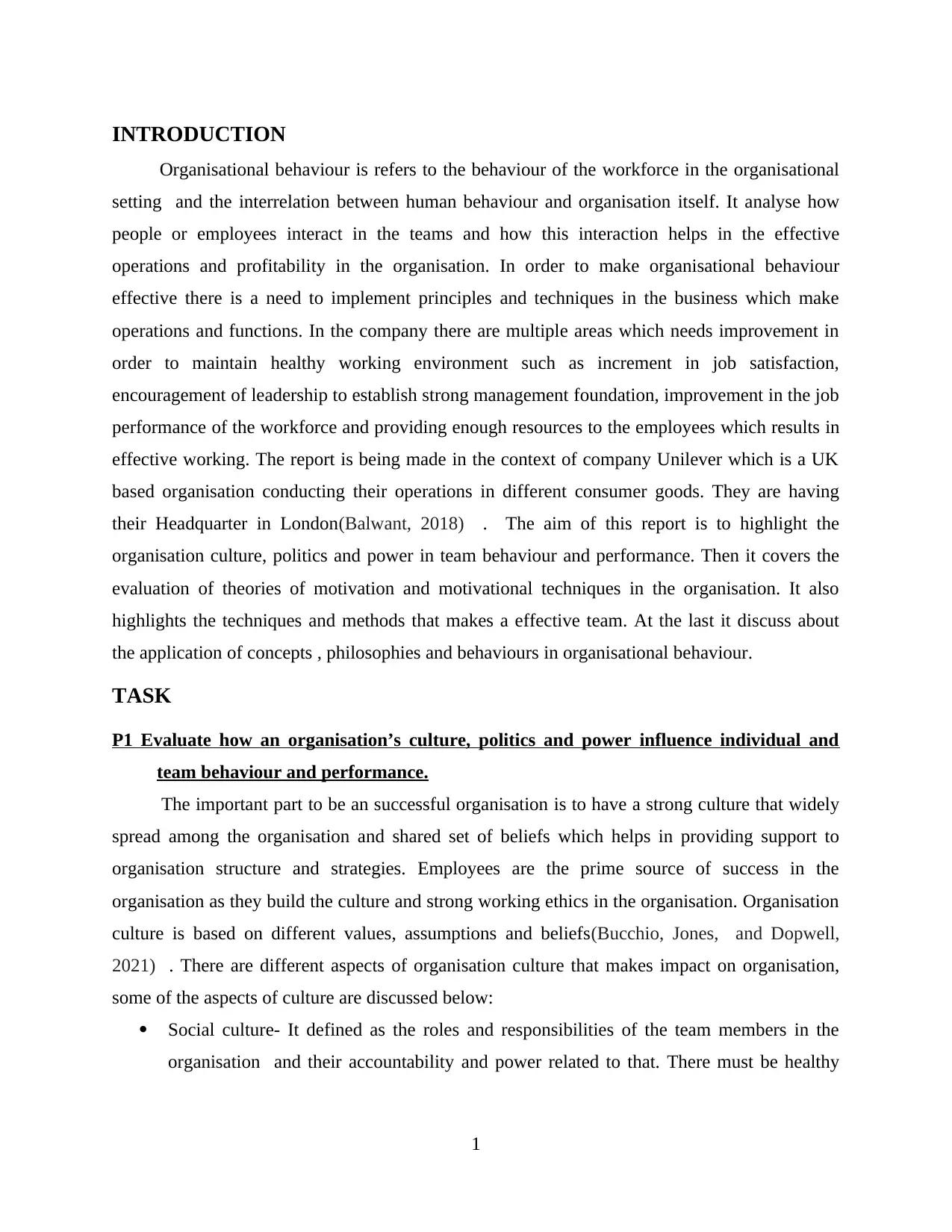
INTRODUCTION
Organisational behaviour is refers to the behaviour of the workforce in the organisational
setting and the interrelation between human behaviour and organisation itself. It analyse how
people or employees interact in the teams and how this interaction helps in the effective
operations and profitability in the organisation. In order to make organisational behaviour
effective there is a need to implement principles and techniques in the business which make
operations and functions. In the company there are multiple areas which needs improvement in
order to maintain healthy working environment such as increment in job satisfaction,
encouragement of leadership to establish strong management foundation, improvement in the job
performance of the workforce and providing enough resources to the employees which results in
effective working. The report is being made in the context of company Unilever which is a UK
based organisation conducting their operations in different consumer goods. They are having
their Headquarter in London(Balwant, 2018) . The aim of this report is to highlight the
organisation culture, politics and power in team behaviour and performance. Then it covers the
evaluation of theories of motivation and motivational techniques in the organisation. It also
highlights the techniques and methods that makes a effective team. At the last it discuss about
the application of concepts , philosophies and behaviours in organisational behaviour.
TASK
P1 Evaluate how an organisation’s culture, politics and power influence individual and
team behaviour and performance.
The important part to be an successful organisation is to have a strong culture that widely
spread among the organisation and shared set of beliefs which helps in providing support to
organisation structure and strategies. Employees are the prime source of success in the
organisation as they build the culture and strong working ethics in the organisation. Organisation
culture is based on different values, assumptions and beliefs(Bucchio, Jones, and Dopwell,
2021) . There are different aspects of organisation culture that makes impact on organisation,
some of the aspects of culture are discussed below:
Social culture- It defined as the roles and responsibilities of the team members in the
organisation and their accountability and power related to that. There must be healthy
1
Organisational behaviour is refers to the behaviour of the workforce in the organisational
setting and the interrelation between human behaviour and organisation itself. It analyse how
people or employees interact in the teams and how this interaction helps in the effective
operations and profitability in the organisation. In order to make organisational behaviour
effective there is a need to implement principles and techniques in the business which make
operations and functions. In the company there are multiple areas which needs improvement in
order to maintain healthy working environment such as increment in job satisfaction,
encouragement of leadership to establish strong management foundation, improvement in the job
performance of the workforce and providing enough resources to the employees which results in
effective working. The report is being made in the context of company Unilever which is a UK
based organisation conducting their operations in different consumer goods. They are having
their Headquarter in London(Balwant, 2018) . The aim of this report is to highlight the
organisation culture, politics and power in team behaviour and performance. Then it covers the
evaluation of theories of motivation and motivational techniques in the organisation. It also
highlights the techniques and methods that makes a effective team. At the last it discuss about
the application of concepts , philosophies and behaviours in organisational behaviour.
TASK
P1 Evaluate how an organisation’s culture, politics and power influence individual and
team behaviour and performance.
The important part to be an successful organisation is to have a strong culture that widely
spread among the organisation and shared set of beliefs which helps in providing support to
organisation structure and strategies. Employees are the prime source of success in the
organisation as they build the culture and strong working ethics in the organisation. Organisation
culture is based on different values, assumptions and beliefs(Bucchio, Jones, and Dopwell,
2021) . There are different aspects of organisation culture that makes impact on organisation,
some of the aspects of culture are discussed below:
Social culture- It defined as the roles and responsibilities of the team members in the
organisation and their accountability and power related to that. There must be healthy
1
⊘ This is a preview!⊘
Do you want full access?
Subscribe today to unlock all pages.

Trusted by 1+ million students worldwide
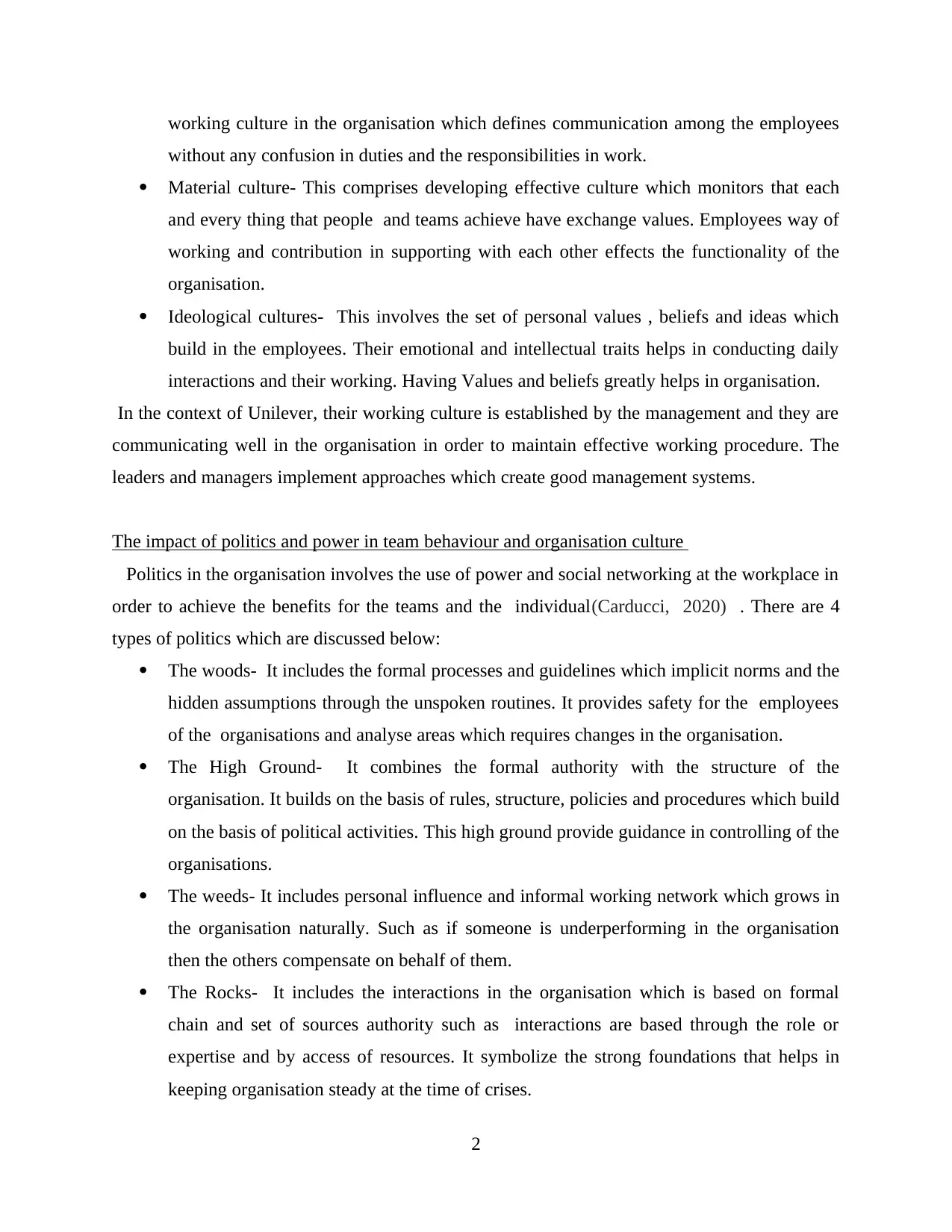
working culture in the organisation which defines communication among the employees
without any confusion in duties and the responsibilities in work.
Material culture- This comprises developing effective culture which monitors that each
and every thing that people and teams achieve have exchange values. Employees way of
working and contribution in supporting with each other effects the functionality of the
organisation.
Ideological cultures- This involves the set of personal values , beliefs and ideas which
build in the employees. Their emotional and intellectual traits helps in conducting daily
interactions and their working. Having Values and beliefs greatly helps in organisation.
In the context of Unilever, their working culture is established by the management and they are
communicating well in the organisation in order to maintain effective working procedure. The
leaders and managers implement approaches which create good management systems.
The impact of politics and power in team behaviour and organisation culture
Politics in the organisation involves the use of power and social networking at the workplace in
order to achieve the benefits for the teams and the individual(Carducci, 2020) . There are 4
types of politics which are discussed below:
The woods- It includes the formal processes and guidelines which implicit norms and the
hidden assumptions through the unspoken routines. It provides safety for the employees
of the organisations and analyse areas which requires changes in the organisation.
The High Ground- It combines the formal authority with the structure of the
organisation. It builds on the basis of rules, structure, policies and procedures which build
on the basis of political activities. This high ground provide guidance in controlling of the
organisations.
The weeds- It includes personal influence and informal working network which grows in
the organisation naturally. Such as if someone is underperforming in the organisation
then the others compensate on behalf of them.
The Rocks- It includes the interactions in the organisation which is based on formal
chain and set of sources authority such as interactions are based through the role or
expertise and by access of resources. It symbolize the strong foundations that helps in
keeping organisation steady at the time of crises.
2
without any confusion in duties and the responsibilities in work.
Material culture- This comprises developing effective culture which monitors that each
and every thing that people and teams achieve have exchange values. Employees way of
working and contribution in supporting with each other effects the functionality of the
organisation.
Ideological cultures- This involves the set of personal values , beliefs and ideas which
build in the employees. Their emotional and intellectual traits helps in conducting daily
interactions and their working. Having Values and beliefs greatly helps in organisation.
In the context of Unilever, their working culture is established by the management and they are
communicating well in the organisation in order to maintain effective working procedure. The
leaders and managers implement approaches which create good management systems.
The impact of politics and power in team behaviour and organisation culture
Politics in the organisation involves the use of power and social networking at the workplace in
order to achieve the benefits for the teams and the individual(Carducci, 2020) . There are 4
types of politics which are discussed below:
The woods- It includes the formal processes and guidelines which implicit norms and the
hidden assumptions through the unspoken routines. It provides safety for the employees
of the organisations and analyse areas which requires changes in the organisation.
The High Ground- It combines the formal authority with the structure of the
organisation. It builds on the basis of rules, structure, policies and procedures which build
on the basis of political activities. This high ground provide guidance in controlling of the
organisations.
The weeds- It includes personal influence and informal working network which grows in
the organisation naturally. Such as if someone is underperforming in the organisation
then the others compensate on behalf of them.
The Rocks- It includes the interactions in the organisation which is based on formal
chain and set of sources authority such as interactions are based through the role or
expertise and by access of resources. It symbolize the strong foundations that helps in
keeping organisation steady at the time of crises.
2
Paraphrase This Document
Need a fresh take? Get an instant paraphrase of this document with our AI Paraphraser
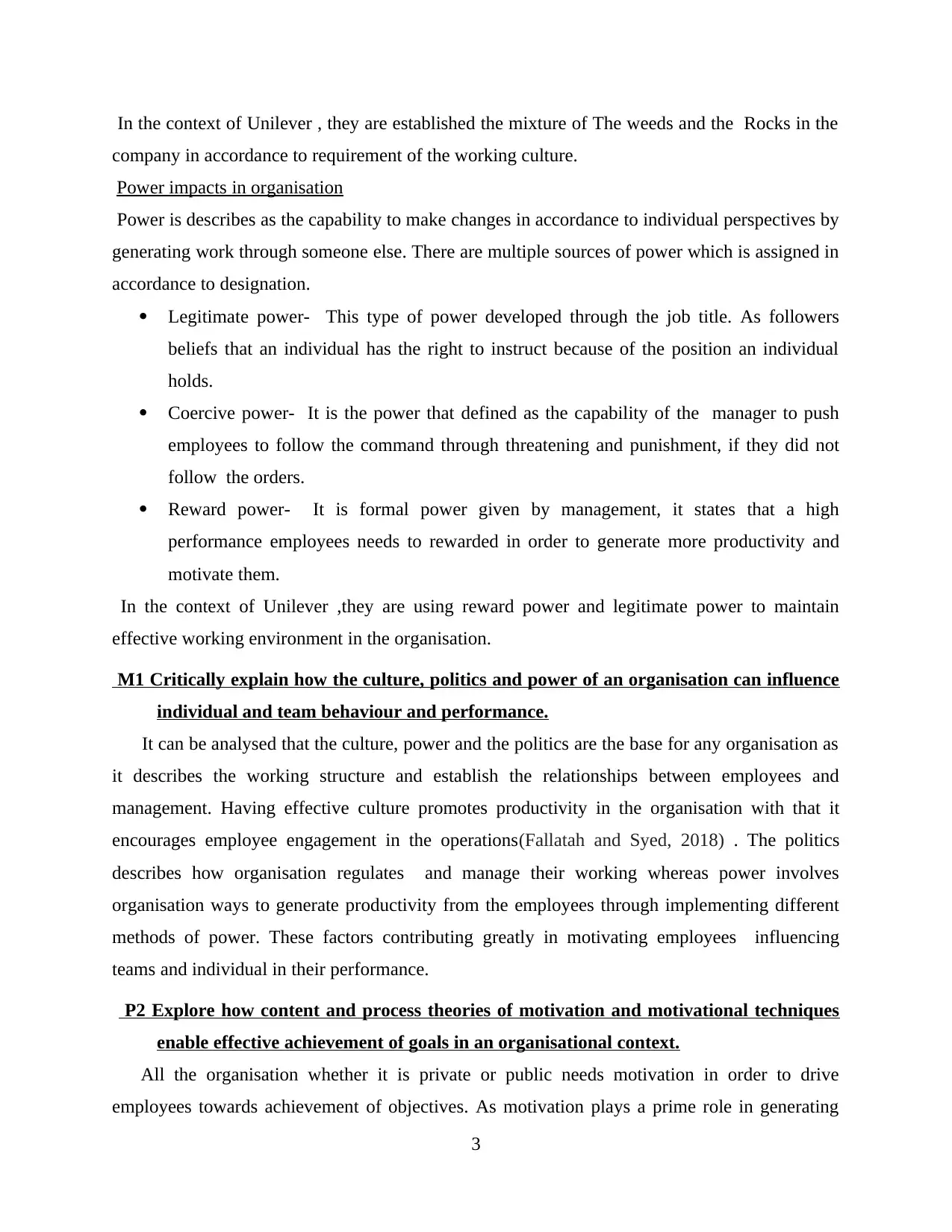
In the context of Unilever , they are established the mixture of The weeds and the Rocks in the
company in accordance to requirement of the working culture.
Power impacts in organisation
Power is describes as the capability to make changes in accordance to individual perspectives by
generating work through someone else. There are multiple sources of power which is assigned in
accordance to designation.
Legitimate power- This type of power developed through the job title. As followers
beliefs that an individual has the right to instruct because of the position an individual
holds.
Coercive power- It is the power that defined as the capability of the manager to push
employees to follow the command through threatening and punishment, if they did not
follow the orders.
Reward power- It is formal power given by management, it states that a high
performance employees needs to rewarded in order to generate more productivity and
motivate them.
In the context of Unilever ,they are using reward power and legitimate power to maintain
effective working environment in the organisation.
M1 Critically explain how the culture, politics and power of an organisation can influence
individual and team behaviour and performance.
It can be analysed that the culture, power and the politics are the base for any organisation as
it describes the working structure and establish the relationships between employees and
management. Having effective culture promotes productivity in the organisation with that it
encourages employee engagement in the operations(Fallatah and Syed, 2018) . The politics
describes how organisation regulates and manage their working whereas power involves
organisation ways to generate productivity from the employees through implementing different
methods of power. These factors contributing greatly in motivating employees influencing
teams and individual in their performance.
P2 Explore how content and process theories of motivation and motivational techniques
enable effective achievement of goals in an organisational context.
All the organisation whether it is private or public needs motivation in order to drive
employees towards achievement of objectives. As motivation plays a prime role in generating
3
company in accordance to requirement of the working culture.
Power impacts in organisation
Power is describes as the capability to make changes in accordance to individual perspectives by
generating work through someone else. There are multiple sources of power which is assigned in
accordance to designation.
Legitimate power- This type of power developed through the job title. As followers
beliefs that an individual has the right to instruct because of the position an individual
holds.
Coercive power- It is the power that defined as the capability of the manager to push
employees to follow the command through threatening and punishment, if they did not
follow the orders.
Reward power- It is formal power given by management, it states that a high
performance employees needs to rewarded in order to generate more productivity and
motivate them.
In the context of Unilever ,they are using reward power and legitimate power to maintain
effective working environment in the organisation.
M1 Critically explain how the culture, politics and power of an organisation can influence
individual and team behaviour and performance.
It can be analysed that the culture, power and the politics are the base for any organisation as
it describes the working structure and establish the relationships between employees and
management. Having effective culture promotes productivity in the organisation with that it
encourages employee engagement in the operations(Fallatah and Syed, 2018) . The politics
describes how organisation regulates and manage their working whereas power involves
organisation ways to generate productivity from the employees through implementing different
methods of power. These factors contributing greatly in motivating employees influencing
teams and individual in their performance.
P2 Explore how content and process theories of motivation and motivational techniques
enable effective achievement of goals in an organisational context.
All the organisation whether it is private or public needs motivation in order to drive
employees towards achievement of objectives. As motivation plays a prime role in generating
3
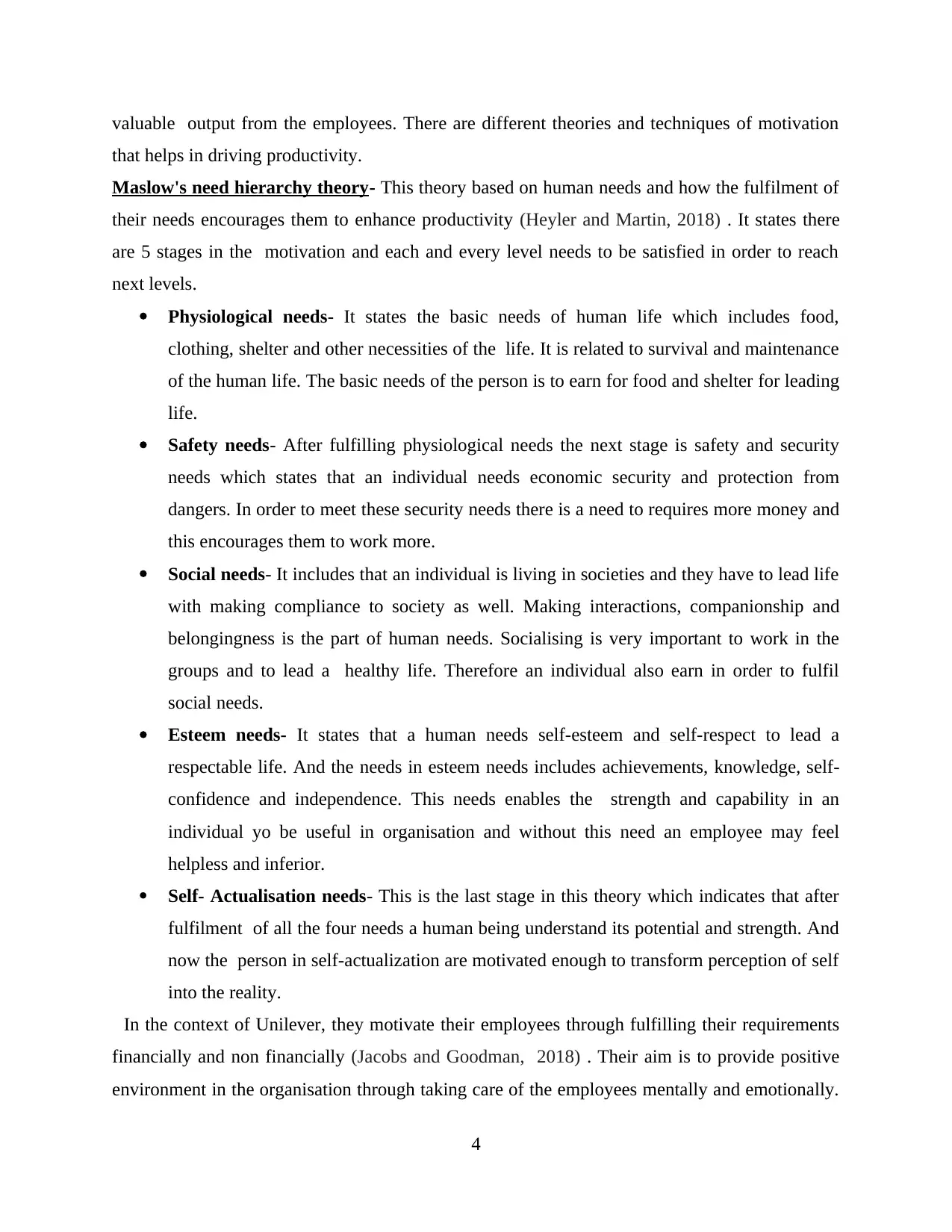
valuable output from the employees. There are different theories and techniques of motivation
that helps in driving productivity.
Maslow's need hierarchy theory- This theory based on human needs and how the fulfilment of
their needs encourages them to enhance productivity (Heyler and Martin, 2018) . It states there
are 5 stages in the motivation and each and every level needs to be satisfied in order to reach
next levels.
Physiological needs- It states the basic needs of human life which includes food,
clothing, shelter and other necessities of the life. It is related to survival and maintenance
of the human life. The basic needs of the person is to earn for food and shelter for leading
life.
Safety needs- After fulfilling physiological needs the next stage is safety and security
needs which states that an individual needs economic security and protection from
dangers. In order to meet these security needs there is a need to requires more money and
this encourages them to work more.
Social needs- It includes that an individual is living in societies and they have to lead life
with making compliance to society as well. Making interactions, companionship and
belongingness is the part of human needs. Socialising is very important to work in the
groups and to lead a healthy life. Therefore an individual also earn in order to fulfil
social needs.
Esteem needs- It states that a human needs self-esteem and self-respect to lead a
respectable life. And the needs in esteem needs includes achievements, knowledge, self-
confidence and independence. This needs enables the strength and capability in an
individual yo be useful in organisation and without this need an employee may feel
helpless and inferior.
Self- Actualisation needs- This is the last stage in this theory which indicates that after
fulfilment of all the four needs a human being understand its potential and strength. And
now the person in self-actualization are motivated enough to transform perception of self
into the reality.
In the context of Unilever, they motivate their employees through fulfilling their requirements
financially and non financially (Jacobs and Goodman, 2018) . Their aim is to provide positive
environment in the organisation through taking care of the employees mentally and emotionally.
4
that helps in driving productivity.
Maslow's need hierarchy theory- This theory based on human needs and how the fulfilment of
their needs encourages them to enhance productivity (Heyler and Martin, 2018) . It states there
are 5 stages in the motivation and each and every level needs to be satisfied in order to reach
next levels.
Physiological needs- It states the basic needs of human life which includes food,
clothing, shelter and other necessities of the life. It is related to survival and maintenance
of the human life. The basic needs of the person is to earn for food and shelter for leading
life.
Safety needs- After fulfilling physiological needs the next stage is safety and security
needs which states that an individual needs economic security and protection from
dangers. In order to meet these security needs there is a need to requires more money and
this encourages them to work more.
Social needs- It includes that an individual is living in societies and they have to lead life
with making compliance to society as well. Making interactions, companionship and
belongingness is the part of human needs. Socialising is very important to work in the
groups and to lead a healthy life. Therefore an individual also earn in order to fulfil
social needs.
Esteem needs- It states that a human needs self-esteem and self-respect to lead a
respectable life. And the needs in esteem needs includes achievements, knowledge, self-
confidence and independence. This needs enables the strength and capability in an
individual yo be useful in organisation and without this need an employee may feel
helpless and inferior.
Self- Actualisation needs- This is the last stage in this theory which indicates that after
fulfilment of all the four needs a human being understand its potential and strength. And
now the person in self-actualization are motivated enough to transform perception of self
into the reality.
In the context of Unilever, they motivate their employees through fulfilling their requirements
financially and non financially (Jacobs and Goodman, 2018) . Their aim is to provide positive
environment in the organisation through taking care of the employees mentally and emotionally.
4
⊘ This is a preview!⊘
Do you want full access?
Subscribe today to unlock all pages.

Trusted by 1+ million students worldwide
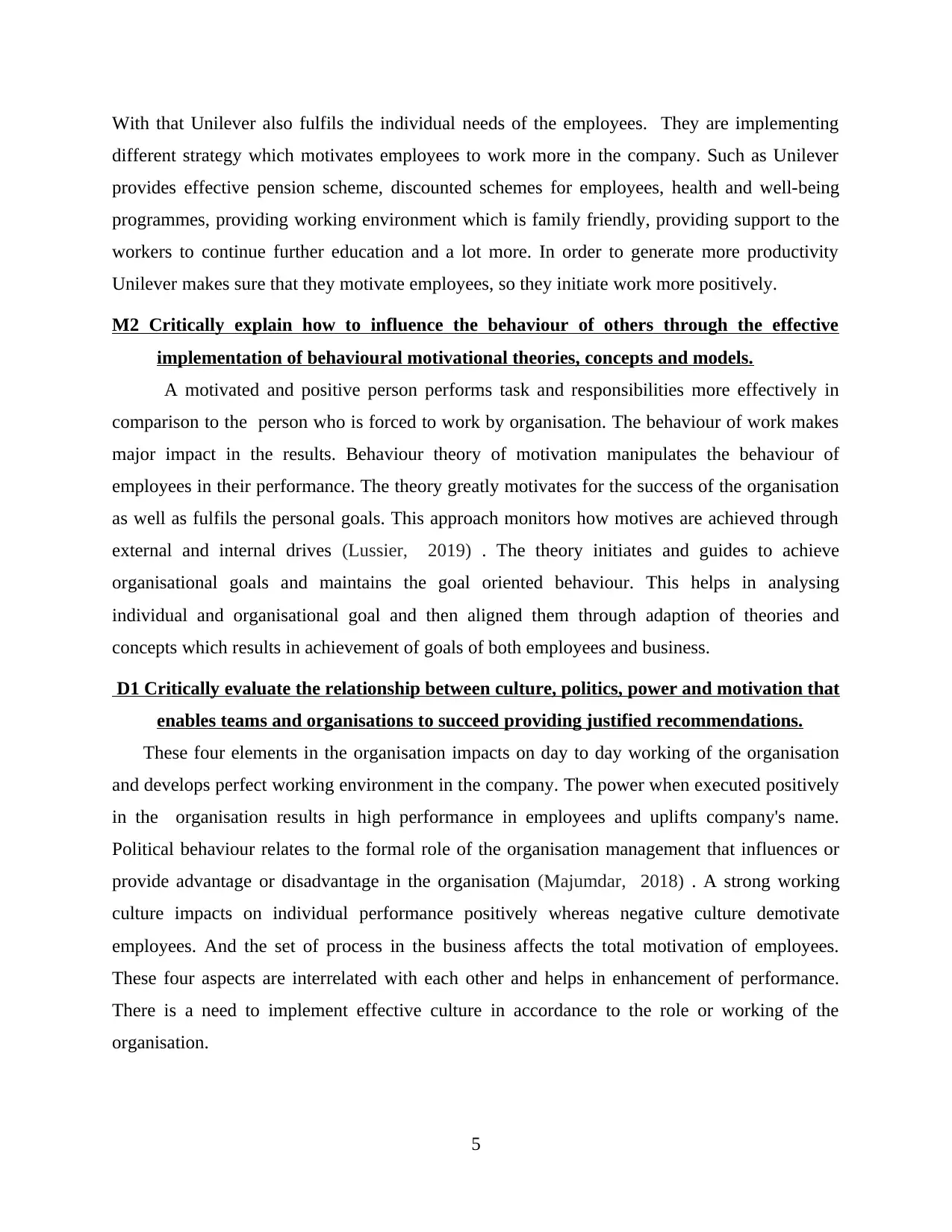
With that Unilever also fulfils the individual needs of the employees. They are implementing
different strategy which motivates employees to work more in the company. Such as Unilever
provides effective pension scheme, discounted schemes for employees, health and well-being
programmes, providing working environment which is family friendly, providing support to the
workers to continue further education and a lot more. In order to generate more productivity
Unilever makes sure that they motivate employees, so they initiate work more positively.
M2 Critically explain how to influence the behaviour of others through the effective
implementation of behavioural motivational theories, concepts and models.
A motivated and positive person performs task and responsibilities more effectively in
comparison to the person who is forced to work by organisation. The behaviour of work makes
major impact in the results. Behaviour theory of motivation manipulates the behaviour of
employees in their performance. The theory greatly motivates for the success of the organisation
as well as fulfils the personal goals. This approach monitors how motives are achieved through
external and internal drives (Lussier, 2019) . The theory initiates and guides to achieve
organisational goals and maintains the goal oriented behaviour. This helps in analysing
individual and organisational goal and then aligned them through adaption of theories and
concepts which results in achievement of goals of both employees and business.
D1 Critically evaluate the relationship between culture, politics, power and motivation that
enables teams and organisations to succeed providing justified recommendations.
These four elements in the organisation impacts on day to day working of the organisation
and develops perfect working environment in the company. The power when executed positively
in the organisation results in high performance in employees and uplifts company's name.
Political behaviour relates to the formal role of the organisation management that influences or
provide advantage or disadvantage in the organisation (Majumdar, 2018) . A strong working
culture impacts on individual performance positively whereas negative culture demotivate
employees. And the set of process in the business affects the total motivation of employees.
These four aspects are interrelated with each other and helps in enhancement of performance.
There is a need to implement effective culture in accordance to the role or working of the
organisation.
5
different strategy which motivates employees to work more in the company. Such as Unilever
provides effective pension scheme, discounted schemes for employees, health and well-being
programmes, providing working environment which is family friendly, providing support to the
workers to continue further education and a lot more. In order to generate more productivity
Unilever makes sure that they motivate employees, so they initiate work more positively.
M2 Critically explain how to influence the behaviour of others through the effective
implementation of behavioural motivational theories, concepts and models.
A motivated and positive person performs task and responsibilities more effectively in
comparison to the person who is forced to work by organisation. The behaviour of work makes
major impact in the results. Behaviour theory of motivation manipulates the behaviour of
employees in their performance. The theory greatly motivates for the success of the organisation
as well as fulfils the personal goals. This approach monitors how motives are achieved through
external and internal drives (Lussier, 2019) . The theory initiates and guides to achieve
organisational goals and maintains the goal oriented behaviour. This helps in analysing
individual and organisational goal and then aligned them through adaption of theories and
concepts which results in achievement of goals of both employees and business.
D1 Critically evaluate the relationship between culture, politics, power and motivation that
enables teams and organisations to succeed providing justified recommendations.
These four elements in the organisation impacts on day to day working of the organisation
and develops perfect working environment in the company. The power when executed positively
in the organisation results in high performance in employees and uplifts company's name.
Political behaviour relates to the formal role of the organisation management that influences or
provide advantage or disadvantage in the organisation (Majumdar, 2018) . A strong working
culture impacts on individual performance positively whereas negative culture demotivate
employees. And the set of process in the business affects the total motivation of employees.
These four aspects are interrelated with each other and helps in enhancement of performance.
There is a need to implement effective culture in accordance to the role or working of the
organisation.
5
Paraphrase This Document
Need a fresh take? Get an instant paraphrase of this document with our AI Paraphraser
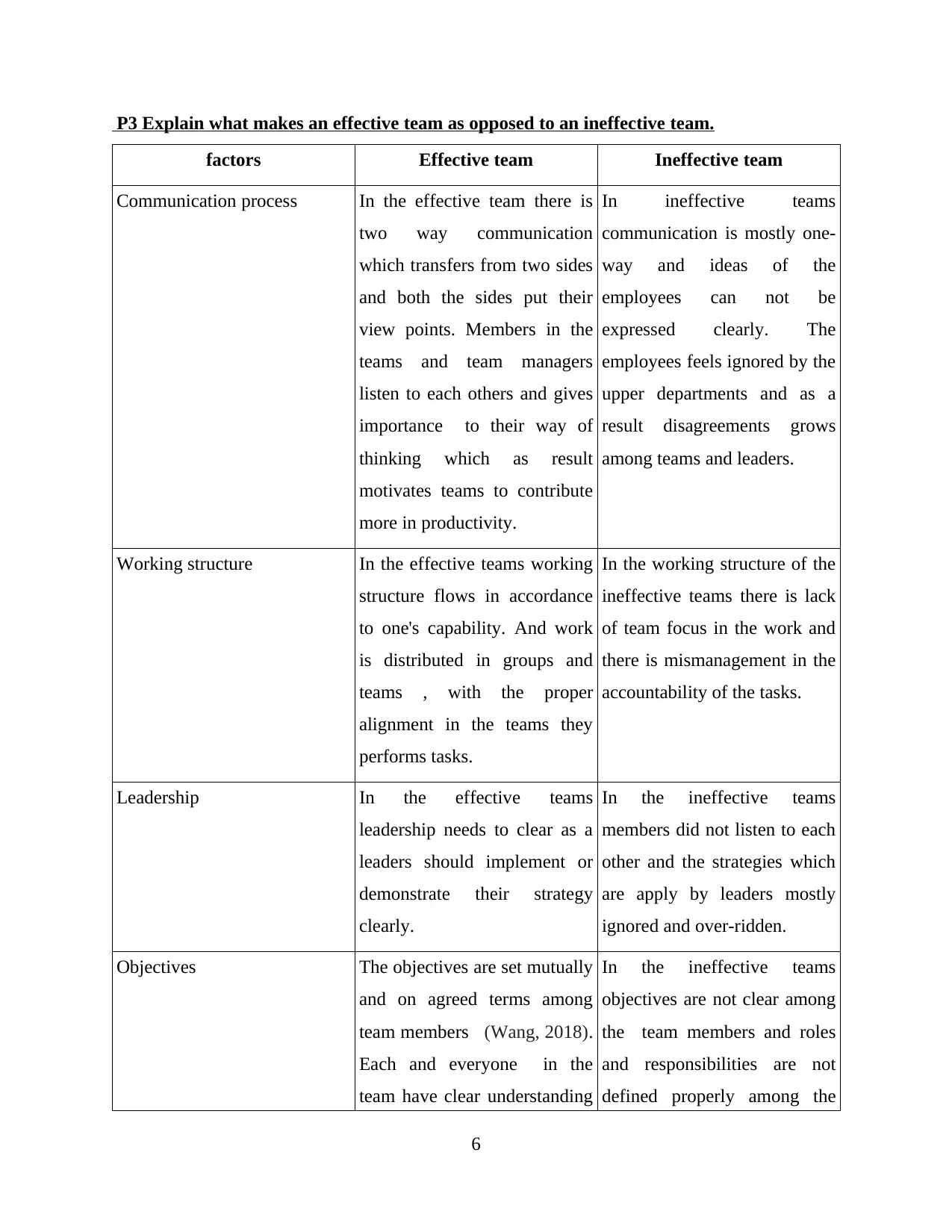
P3 Explain what makes an effective team as opposed to an ineffective team.
factors Effective team Ineffective team
Communication process In the effective team there is
two way communication
which transfers from two sides
and both the sides put their
view points. Members in the
teams and team managers
listen to each others and gives
importance to their way of
thinking which as result
motivates teams to contribute
more in productivity.
In ineffective teams
communication is mostly one-
way and ideas of the
employees can not be
expressed clearly. The
employees feels ignored by the
upper departments and as a
result disagreements grows
among teams and leaders.
Working structure In the effective teams working
structure flows in accordance
to one's capability. And work
is distributed in groups and
teams , with the proper
alignment in the teams they
performs tasks.
In the working structure of the
ineffective teams there is lack
of team focus in the work and
there is mismanagement in the
accountability of the tasks.
Leadership In the effective teams
leadership needs to clear as a
leaders should implement or
demonstrate their strategy
clearly.
In the ineffective teams
members did not listen to each
other and the strategies which
are apply by leaders mostly
ignored and over-ridden.
Objectives The objectives are set mutually
and on agreed terms among
team members (Wang, 2018).
Each and everyone in the
team have clear understanding
In the ineffective teams
objectives are not clear among
the team members and roles
and responsibilities are not
defined properly among the
6
factors Effective team Ineffective team
Communication process In the effective team there is
two way communication
which transfers from two sides
and both the sides put their
view points. Members in the
teams and team managers
listen to each others and gives
importance to their way of
thinking which as result
motivates teams to contribute
more in productivity.
In ineffective teams
communication is mostly one-
way and ideas of the
employees can not be
expressed clearly. The
employees feels ignored by the
upper departments and as a
result disagreements grows
among teams and leaders.
Working structure In the effective teams working
structure flows in accordance
to one's capability. And work
is distributed in groups and
teams , with the proper
alignment in the teams they
performs tasks.
In the working structure of the
ineffective teams there is lack
of team focus in the work and
there is mismanagement in the
accountability of the tasks.
Leadership In the effective teams
leadership needs to clear as a
leaders should implement or
demonstrate their strategy
clearly.
In the ineffective teams
members did not listen to each
other and the strategies which
are apply by leaders mostly
ignored and over-ridden.
Objectives The objectives are set mutually
and on agreed terms among
team members (Wang, 2018).
Each and everyone in the
team have clear understanding
In the ineffective teams
objectives are not clear among
the team members and roles
and responsibilities are not
defined properly among the
6
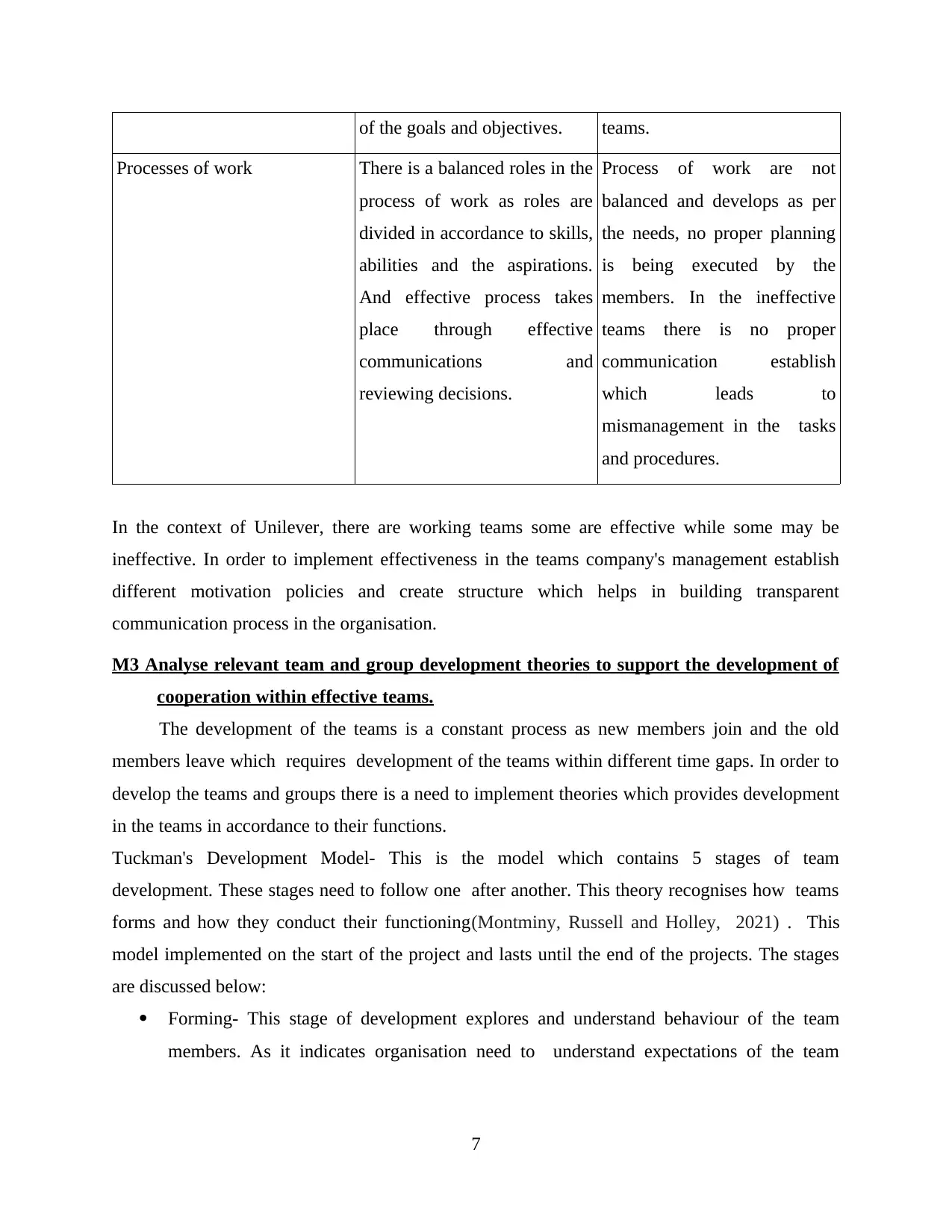
of the goals and objectives. teams.
Processes of work There is a balanced roles in the
process of work as roles are
divided in accordance to skills,
abilities and the aspirations.
And effective process takes
place through effective
communications and
reviewing decisions.
Process of work are not
balanced and develops as per
the needs, no proper planning
is being executed by the
members. In the ineffective
teams there is no proper
communication establish
which leads to
mismanagement in the tasks
and procedures.
In the context of Unilever, there are working teams some are effective while some may be
ineffective. In order to implement effectiveness in the teams company's management establish
different motivation policies and create structure which helps in building transparent
communication process in the organisation.
M3 Analyse relevant team and group development theories to support the development of
cooperation within effective teams.
The development of the teams is a constant process as new members join and the old
members leave which requires development of the teams within different time gaps. In order to
develop the teams and groups there is a need to implement theories which provides development
in the teams in accordance to their functions.
Tuckman's Development Model- This is the model which contains 5 stages of team
development. These stages need to follow one after another. This theory recognises how teams
forms and how they conduct their functioning(Montminy, Russell and Holley, 2021) . This
model implemented on the start of the project and lasts until the end of the projects. The stages
are discussed below:
Forming- This stage of development explores and understand behaviour of the team
members. As it indicates organisation need to understand expectations of the team
7
Processes of work There is a balanced roles in the
process of work as roles are
divided in accordance to skills,
abilities and the aspirations.
And effective process takes
place through effective
communications and
reviewing decisions.
Process of work are not
balanced and develops as per
the needs, no proper planning
is being executed by the
members. In the ineffective
teams there is no proper
communication establish
which leads to
mismanagement in the tasks
and procedures.
In the context of Unilever, there are working teams some are effective while some may be
ineffective. In order to implement effectiveness in the teams company's management establish
different motivation policies and create structure which helps in building transparent
communication process in the organisation.
M3 Analyse relevant team and group development theories to support the development of
cooperation within effective teams.
The development of the teams is a constant process as new members join and the old
members leave which requires development of the teams within different time gaps. In order to
develop the teams and groups there is a need to implement theories which provides development
in the teams in accordance to their functions.
Tuckman's Development Model- This is the model which contains 5 stages of team
development. These stages need to follow one after another. This theory recognises how teams
forms and how they conduct their functioning(Montminy, Russell and Holley, 2021) . This
model implemented on the start of the project and lasts until the end of the projects. The stages
are discussed below:
Forming- This stage of development explores and understand behaviour of the team
members. As it indicates organisation need to understand expectations of the team
7
⊘ This is a preview!⊘
Do you want full access?
Subscribe today to unlock all pages.

Trusted by 1+ million students worldwide
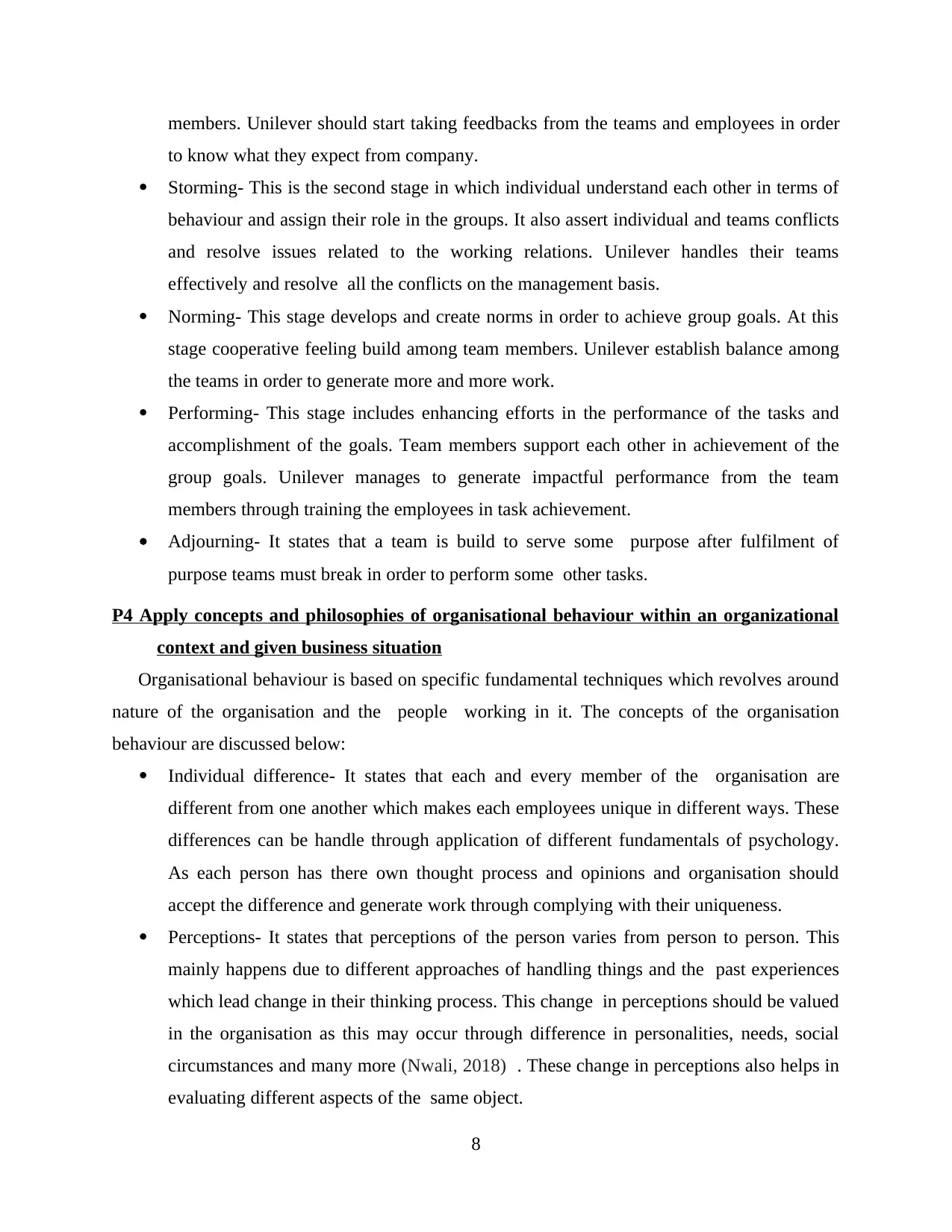
members. Unilever should start taking feedbacks from the teams and employees in order
to know what they expect from company.
Storming- This is the second stage in which individual understand each other in terms of
behaviour and assign their role in the groups. It also assert individual and teams conflicts
and resolve issues related to the working relations. Unilever handles their teams
effectively and resolve all the conflicts on the management basis.
Norming- This stage develops and create norms in order to achieve group goals. At this
stage cooperative feeling build among team members. Unilever establish balance among
the teams in order to generate more and more work.
Performing- This stage includes enhancing efforts in the performance of the tasks and
accomplishment of the goals. Team members support each other in achievement of the
group goals. Unilever manages to generate impactful performance from the team
members through training the employees in task achievement.
Adjourning- It states that a team is build to serve some purpose after fulfilment of
purpose teams must break in order to perform some other tasks.
P4 Apply concepts and philosophies of organisational behaviour within an organizational
context and given business situation
Organisational behaviour is based on specific fundamental techniques which revolves around
nature of the organisation and the people working in it. The concepts of the organisation
behaviour are discussed below:
Individual difference- It states that each and every member of the organisation are
different from one another which makes each employees unique in different ways. These
differences can be handle through application of different fundamentals of psychology.
As each person has there own thought process and opinions and organisation should
accept the difference and generate work through complying with their uniqueness.
Perceptions- It states that perceptions of the person varies from person to person. This
mainly happens due to different approaches of handling things and the past experiences
which lead change in their thinking process. This change in perceptions should be valued
in the organisation as this may occur through difference in personalities, needs, social
circumstances and many more (Nwali, 2018) . These change in perceptions also helps in
evaluating different aspects of the same object.
8
to know what they expect from company.
Storming- This is the second stage in which individual understand each other in terms of
behaviour and assign their role in the groups. It also assert individual and teams conflicts
and resolve issues related to the working relations. Unilever handles their teams
effectively and resolve all the conflicts on the management basis.
Norming- This stage develops and create norms in order to achieve group goals. At this
stage cooperative feeling build among team members. Unilever establish balance among
the teams in order to generate more and more work.
Performing- This stage includes enhancing efforts in the performance of the tasks and
accomplishment of the goals. Team members support each other in achievement of the
group goals. Unilever manages to generate impactful performance from the team
members through training the employees in task achievement.
Adjourning- It states that a team is build to serve some purpose after fulfilment of
purpose teams must break in order to perform some other tasks.
P4 Apply concepts and philosophies of organisational behaviour within an organizational
context and given business situation
Organisational behaviour is based on specific fundamental techniques which revolves around
nature of the organisation and the people working in it. The concepts of the organisation
behaviour are discussed below:
Individual difference- It states that each and every member of the organisation are
different from one another which makes each employees unique in different ways. These
differences can be handle through application of different fundamentals of psychology.
As each person has there own thought process and opinions and organisation should
accept the difference and generate work through complying with their uniqueness.
Perceptions- It states that perceptions of the person varies from person to person. This
mainly happens due to different approaches of handling things and the past experiences
which lead change in their thinking process. This change in perceptions should be valued
in the organisation as this may occur through difference in personalities, needs, social
circumstances and many more (Nwali, 2018) . These change in perceptions also helps in
evaluating different aspects of the same object.
8
Paraphrase This Document
Need a fresh take? Get an instant paraphrase of this document with our AI Paraphraser
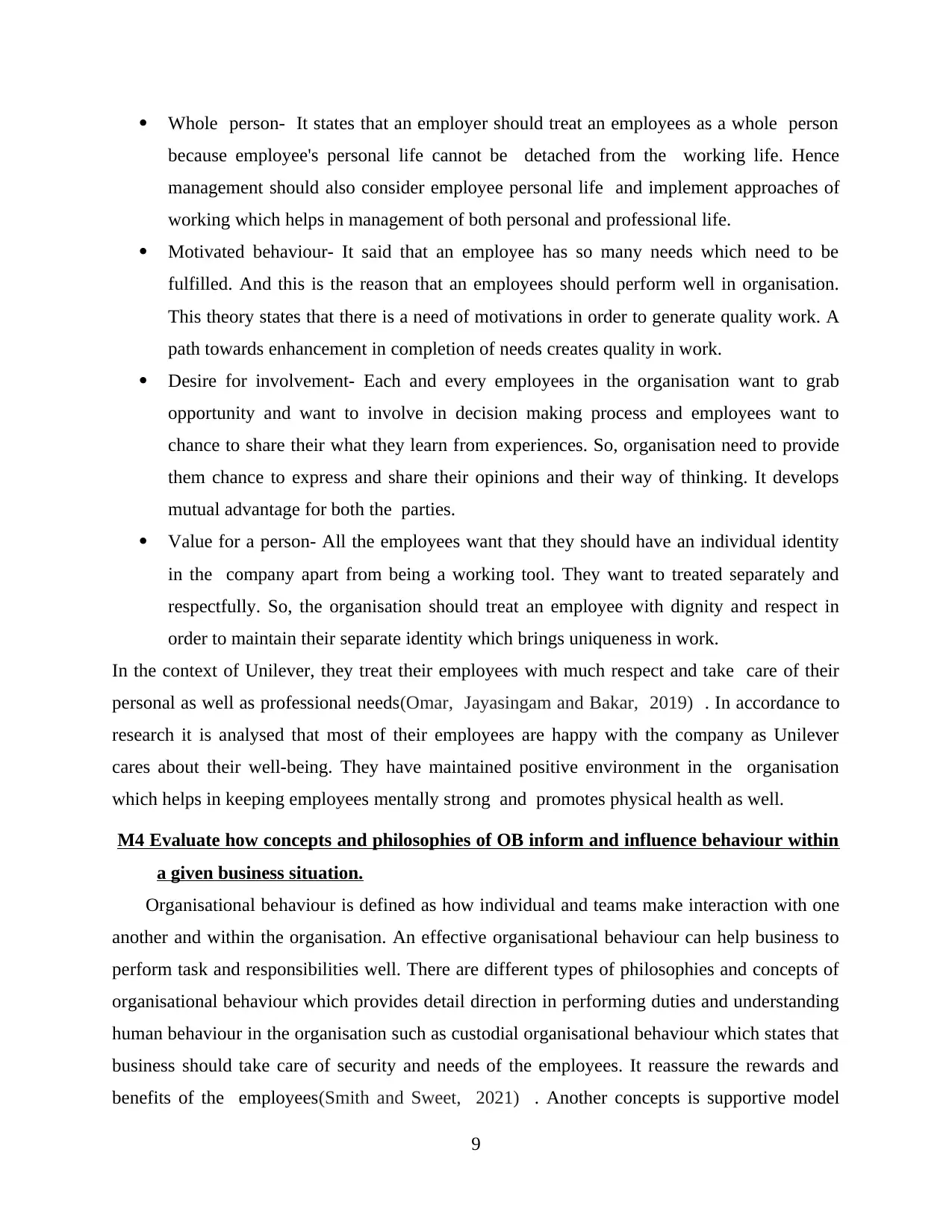
Whole person- It states that an employer should treat an employees as a whole person
because employee's personal life cannot be detached from the working life. Hence
management should also consider employee personal life and implement approaches of
working which helps in management of both personal and professional life.
Motivated behaviour- It said that an employee has so many needs which need to be
fulfilled. And this is the reason that an employees should perform well in organisation.
This theory states that there is a need of motivations in order to generate quality work. A
path towards enhancement in completion of needs creates quality in work.
Desire for involvement- Each and every employees in the organisation want to grab
opportunity and want to involve in decision making process and employees want to
chance to share their what they learn from experiences. So, organisation need to provide
them chance to express and share their opinions and their way of thinking. It develops
mutual advantage for both the parties.
Value for a person- All the employees want that they should have an individual identity
in the company apart from being a working tool. They want to treated separately and
respectfully. So, the organisation should treat an employee with dignity and respect in
order to maintain their separate identity which brings uniqueness in work.
In the context of Unilever, they treat their employees with much respect and take care of their
personal as well as professional needs(Omar, Jayasingam and Bakar, 2019) . In accordance to
research it is analysed that most of their employees are happy with the company as Unilever
cares about their well-being. They have maintained positive environment in the organisation
which helps in keeping employees mentally strong and promotes physical health as well.
M4 Evaluate how concepts and philosophies of OB inform and influence behaviour within
a given business situation.
Organisational behaviour is defined as how individual and teams make interaction with one
another and within the organisation. An effective organisational behaviour can help business to
perform task and responsibilities well. There are different types of philosophies and concepts of
organisational behaviour which provides detail direction in performing duties and understanding
human behaviour in the organisation such as custodial organisational behaviour which states that
business should take care of security and needs of the employees. It reassure the rewards and
benefits of the employees(Smith and Sweet, 2021) . Another concepts is supportive model
9
because employee's personal life cannot be detached from the working life. Hence
management should also consider employee personal life and implement approaches of
working which helps in management of both personal and professional life.
Motivated behaviour- It said that an employee has so many needs which need to be
fulfilled. And this is the reason that an employees should perform well in organisation.
This theory states that there is a need of motivations in order to generate quality work. A
path towards enhancement in completion of needs creates quality in work.
Desire for involvement- Each and every employees in the organisation want to grab
opportunity and want to involve in decision making process and employees want to
chance to share their what they learn from experiences. So, organisation need to provide
them chance to express and share their opinions and their way of thinking. It develops
mutual advantage for both the parties.
Value for a person- All the employees want that they should have an individual identity
in the company apart from being a working tool. They want to treated separately and
respectfully. So, the organisation should treat an employee with dignity and respect in
order to maintain their separate identity which brings uniqueness in work.
In the context of Unilever, they treat their employees with much respect and take care of their
personal as well as professional needs(Omar, Jayasingam and Bakar, 2019) . In accordance to
research it is analysed that most of their employees are happy with the company as Unilever
cares about their well-being. They have maintained positive environment in the organisation
which helps in keeping employees mentally strong and promotes physical health as well.
M4 Evaluate how concepts and philosophies of OB inform and influence behaviour within
a given business situation.
Organisational behaviour is defined as how individual and teams make interaction with one
another and within the organisation. An effective organisational behaviour can help business to
perform task and responsibilities well. There are different types of philosophies and concepts of
organisational behaviour which provides detail direction in performing duties and understanding
human behaviour in the organisation such as custodial organisational behaviour which states that
business should take care of security and needs of the employees. It reassure the rewards and
benefits of the employees(Smith and Sweet, 2021) . Another concepts is supportive model
9
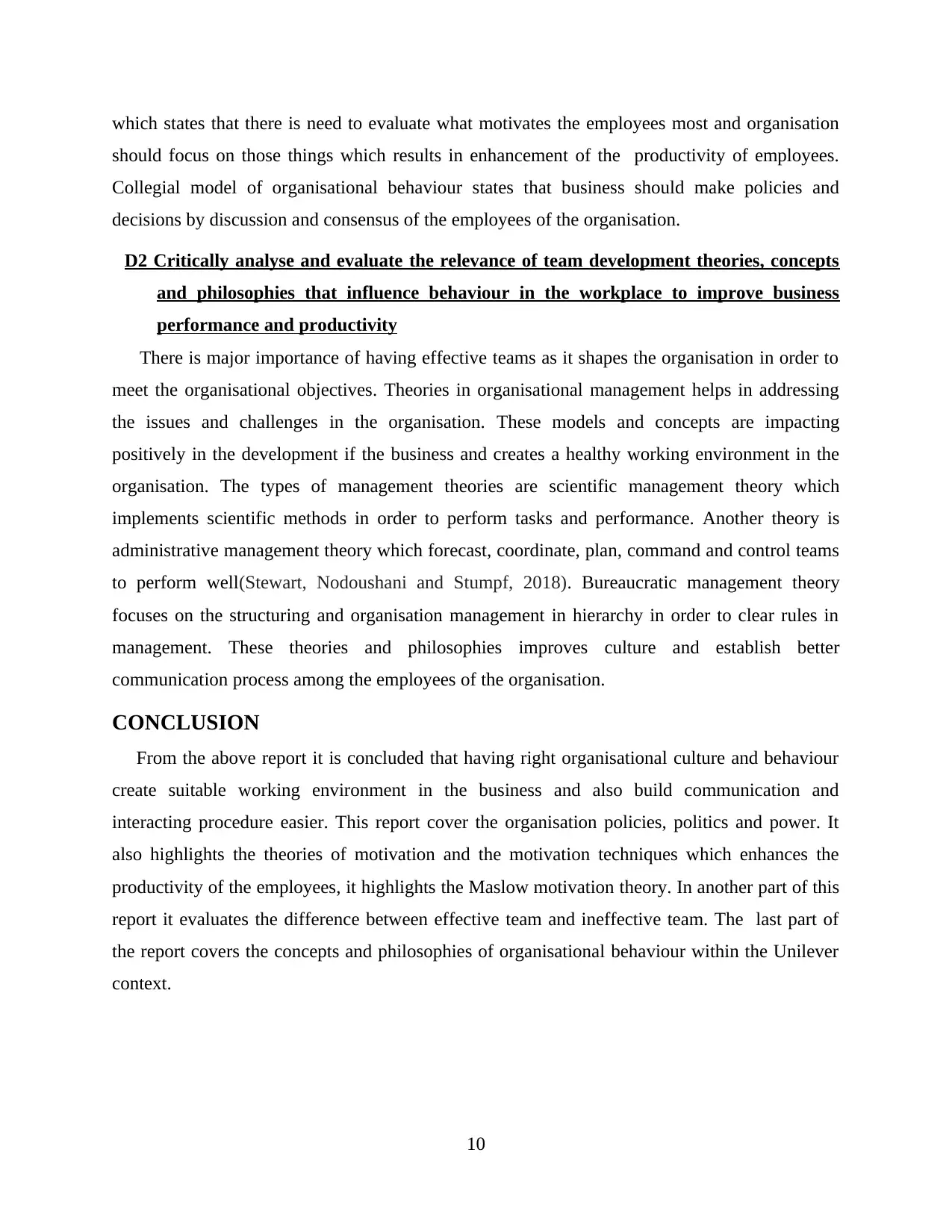
which states that there is need to evaluate what motivates the employees most and organisation
should focus on those things which results in enhancement of the productivity of employees.
Collegial model of organisational behaviour states that business should make policies and
decisions by discussion and consensus of the employees of the organisation.
D2 Critically analyse and evaluate the relevance of team development theories, concepts
and philosophies that influence behaviour in the workplace to improve business
performance and productivity
There is major importance of having effective teams as it shapes the organisation in order to
meet the organisational objectives. Theories in organisational management helps in addressing
the issues and challenges in the organisation. These models and concepts are impacting
positively in the development if the business and creates a healthy working environment in the
organisation. The types of management theories are scientific management theory which
implements scientific methods in order to perform tasks and performance. Another theory is
administrative management theory which forecast, coordinate, plan, command and control teams
to perform well(Stewart, Nodoushani and Stumpf, 2018). Bureaucratic management theory
focuses on the structuring and organisation management in hierarchy in order to clear rules in
management. These theories and philosophies improves culture and establish better
communication process among the employees of the organisation.
CONCLUSION
From the above report it is concluded that having right organisational culture and behaviour
create suitable working environment in the business and also build communication and
interacting procedure easier. This report cover the organisation policies, politics and power. It
also highlights the theories of motivation and the motivation techniques which enhances the
productivity of the employees, it highlights the Maslow motivation theory. In another part of this
report it evaluates the difference between effective team and ineffective team. The last part of
the report covers the concepts and philosophies of organisational behaviour within the Unilever
context.
10
should focus on those things which results in enhancement of the productivity of employees.
Collegial model of organisational behaviour states that business should make policies and
decisions by discussion and consensus of the employees of the organisation.
D2 Critically analyse and evaluate the relevance of team development theories, concepts
and philosophies that influence behaviour in the workplace to improve business
performance and productivity
There is major importance of having effective teams as it shapes the organisation in order to
meet the organisational objectives. Theories in organisational management helps in addressing
the issues and challenges in the organisation. These models and concepts are impacting
positively in the development if the business and creates a healthy working environment in the
organisation. The types of management theories are scientific management theory which
implements scientific methods in order to perform tasks and performance. Another theory is
administrative management theory which forecast, coordinate, plan, command and control teams
to perform well(Stewart, Nodoushani and Stumpf, 2018). Bureaucratic management theory
focuses on the structuring and organisation management in hierarchy in order to clear rules in
management. These theories and philosophies improves culture and establish better
communication process among the employees of the organisation.
CONCLUSION
From the above report it is concluded that having right organisational culture and behaviour
create suitable working environment in the business and also build communication and
interacting procedure easier. This report cover the organisation policies, politics and power. It
also highlights the theories of motivation and the motivation techniques which enhances the
productivity of the employees, it highlights the Maslow motivation theory. In another part of this
report it evaluates the difference between effective team and ineffective team. The last part of
the report covers the concepts and philosophies of organisational behaviour within the Unilever
context.
10
⊘ This is a preview!⊘
Do you want full access?
Subscribe today to unlock all pages.

Trusted by 1+ million students worldwide
1 out of 13
Related Documents
Your All-in-One AI-Powered Toolkit for Academic Success.
+13062052269
info@desklib.com
Available 24*7 on WhatsApp / Email
![[object Object]](/_next/static/media/star-bottom.7253800d.svg)
Unlock your academic potential
Copyright © 2020–2026 A2Z Services. All Rights Reserved. Developed and managed by ZUCOL.